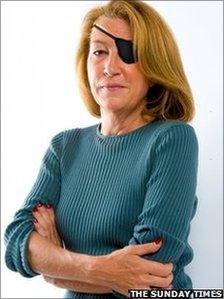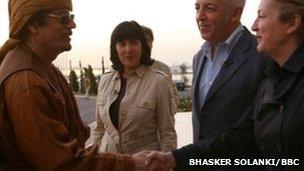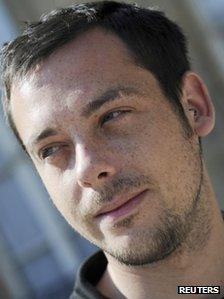Tributes paid to Sunday Times reporter Marie Colvin
- Published

Marie Colvin was described as an "extraordinary woman"
Tributes are pouring in for Sunday Times foreign correspondent Marie Colvin who has been killed during an attack in Homs in Syria.
French photojournalist Remi Ochlik was also killed after shells reportedly hit a makeshift media centre in Baba Amr.
Her mother, Rosemarie Colvin, said her daughter should have left Syria the day she died.
UK Prime Minister David Cameron said Ms Colvin's death was a "sad reminder" of the risks journalists took in Syria.
'Committed journalist'
US State Department spokesman Mark Toner condemned the killings, saying the White House was "deeply troubled and saddened" by the reports of the deaths of the American and her colleague.
Ms Colvin, who had spoken to the BBC the day before she died about the situation in Homs, was one of few Western journalists in the troubled country.
The latest violence in the besieged city of Homs left 60 people dead.
Ms Colvin's mother Rosemarie, who lives in New York, said her daughter had been told by her editor to leave the country because of the danger she was facing, but the award-winning journalist "wanted to finish one more story".
Mrs Colvin told the BBC her daughter was committed to showing the full reality of people in trouble, not just a snapshot, and her work would always involve personal stories from those in the heart of conflict.
"That's the way she wanted to do it, to show that these horrible things were happening, and this oppression was happening to real people and it was something that had to be exposed and had to be written about," she said.
Her brother William said: "She always tried to bear witness to what was happening and get the story right. That's what she did."
Sunday Times owner Rupert Murdoch described Ms Colvin as "one of the most outstanding foreign correspondents of her generation" who was "driven by a determination that the misdeeds of tyrants and the suffering of the victims did not go unreported".
"This was at great personal cost, including the loss of the sight in one eye while covering the civil war in Sri Lanka. This injury did not stop her from returning to even more dangerous assignments," he added.
'Joie de vivre'
Sunday Times editor John Witherow told the BBC Ms Colvin was too experienced in war reporting to take "reckless risks".
"A wonderful person": The BBC's Lyse Doucet pays tribute to Marie Colvin
He said: "She was somebody who was fun, full of life with joie de vivre and friends all over the world. Everybody is in shock at this.
"During her time she saved many lives by highlighting the plight of victims of violence. Everywhere she had gone she tried to help people because she believed she was a witness to the violence that was going on and that she could make a difference."
Mr Cameron told Parliament that the government's thoughts were with Ms Colvin's friends and family.
Foreign Secretary William Hague said: "Marie and Remi died bringing us the truth about what is happening to the people of Homs.
"Governments around the world have the responsibility to act upon that truth - and to redouble our efforts to stop [President Bashar] Assad regime's despicable campaign of terror in Syria."
Labour leader Ed Miliband told Parliament that Ms Colvin was "an inspiration to women in her profession".

Marie Colvin helped the BBC's Jeremy Bowen get one of the major final interviews with Col Gaddafi
'Brave and determined'
Sir Menzies Campbell, the former Lib Dem leader who is also on the Commons foreign affairs committee, said Ms Colvin's reports were "always perceptive, balanced and compelling."
BBC correspondent Jim Muir in Beirut, who had known Ms Colvin for 25 years, said she was both nervous and excited about going to Syria but she felt she had to go.
He said: "She, more than anybody, knew the dangers of war. It's not about glamour, it's not about glory. It's about people being torn to pieces."
Marie Colvin's mother, Rosemarie: "Telling the story was her life"
Peter Bouckaert from Human Rights Watch, said he had spoken to Ms Colvin only on Tuesday.
He said: "For Marie, covering war wasn't about doing a few quick interviews and writing up a quick story: she experienced war alongside those who suffered in war, and her writings had a particular vividness because of what she had dared to see and experience.
Ms Colvin sent Jeremy Bowen, the BBC's Middle East editor, an email on Monday about her Sunday Times article on Homs, external, published on 19 February.
She wrote: "I thought yesterday's piece was one of those we got in to journalism for. They are killing with impunity here, it is sickening and anger-making."
Mr Bowen said: "She was a real nuts and bolts journalist who would get down to get the story."

French photojournalist Remi Ochlik was also killed
The BBC's Lyse Doucet said Ms Colvin was a glamorous, elegant, passionate woman whose focus was always on finding the "quiet bravery" of those she would be reporting on.
"The world will miss her because she was the eyes and ears of so many," she said.
"She admired the pioneering journalism of fellow American Martha Gelhorn. I always saw her as the Martha of our generation: brave and beautiful."
ITN's Bill Neely blogged: "On Monday I sent her a message; 'Bravo Marie. Keep your head down.' This morning I looked at the video of her body in a house in Homs. Her head down. Her voice silenced."
Michelle Stanistreet, general secretary of the National Union of Journalists, said Ms Colvin had lived up to her own desire to "report on the horrors of war with accuracy and without prejudice" with "bravery and grace".
Meanwhile Kate Allen from Amnesty International called Ms Colvin's death "a terrible loss to journalism in this country."
- Published22 February 2012
- Published22 February 2012
- Published22 February 2012
- Published21 February 2012
- Published22 February 2012
 Marie Colvin's last BBC interview
Marie Colvin's last BBC interview
 BBC's Jim Muir pays tribute to Colvin
BBC's Jim Muir pays tribute to Colvin
 Colvin: 'Shining a light'
Colvin: 'Shining a light'
 How Colvin risked life to report in Syria
How Colvin risked life to report in Syria
 Marie Colvin in Misrata, April 2011
Marie Colvin in Misrata, April 2011